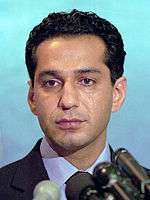Haron Amin
Mohammad Haron Amin (Dari: هارون امین; July 19, 1969[2] – February 15, 2015) was the Afghan ambassador to Japan and non-resident ambassador to Thailand, the Philippines and Singapore from 2004–2009. He is chiefly known, however, for his role as spokesman for the Northern Alliance during the U.S.-led invasion of his country after the events of September 11, 2001.[3]
Haron Amin | |
|---|---|
 Mohammad Haron Amin in 2001 | |
| Afghan Ambassador to Japan | |
| In office April 30, 2004 – April 30, 2009 | |
| President | Hamid Karzai |
| Succeeded by | Eklil Ahmad Hakimi |
| Personal details | |
| Born | Mohammad Haron Amin July 19, 1969[1] Kabul, Afghanistan |
| Died | February 15, 2015 Phoenix, Arizona, United States |
A consistent presence in American media prior to the Taliban's collapse,[4][5] Amin was appointed chargé d'affaires to the United States by the interim Afghan government on January 14, 2002, led by Hamid Karzai. He was the highest-ranking Afghan diplomat in Washington for a year-long period in 2002–03, before being appointed by President Karzai as his country's first Ambassador to Japan on 30 April 2004.[6]
Born in Kabul,[6] his Tajik family fled Afghanistan one year after the Soviet invasion of 1979, eventually settling in the U.S.[3]
He returned to his home country in 1988 to fight with the mujahideen under their commander Ahmed Shah Massoud, who assigned Amin to Afghanistan's embassy in Washington in 1990. Amin worked for the foreign ministry in various capacities until the government's fall to the Taliban in 1996.[7] At the time of the 9/11 attacks, Amin was serving as a diplomat of the Afghan mission to the United Nations.
Amin was distinguished in 2002 as one of 77 "People for the Future" in Newsweek.[8] He earned a master's degree in political science from St. John's University in 2005, and later earned a Certificate of International Law in the school's Master's Program.[6]
In 2007, drawing from his years in Japan, he wrote Afghan–Japan Relations: Lands Under the Rising Sun.[9] The book centers on historical relations and similarities between Japan and Afghanistan, and is the first to directly compare Afghanistan's and Japan's past and cultural heritage.[8]
Awards
Death
Amin died of cancer, which had been first diagnosed in 2011, in a Phoenix-area hospital, on February 14, 2015.[8]
References
- Some sources cite 1967.
- Some sources cite 1967.
- Profile, Afghan-bios.info, November 2, 2009.
- "Amin: Northern Alliance will support U.S." CNN.com. September 22, 2001. Retrieved February 15, 2015.
- "Alliance Advances". PBS. November 12, 2001. Retrieved February 15, 2015.
- "Profile: Haron Amin". Embassy of the Islamic Republic of Afghanistan in Tokyo. Archived from the original on August 19, 2014. Retrieved February 15, 2015.
- Profile, nymag.com; accessed February 25, 2017.
- "Former Afghan Diplomat and Ambassador to Japan Dies". TOLO News. February 15, 2015. Archived from the original on February 15, 2015. Retrieved February 15, 2015.
- Amin, Haron (2007). "Afghan-Japan Relations: Land Under the Rising Sun" (PDF). Embassy of the Islamic Republic of Afghanistan in Tokyo. Retrieved February 15, 2015.